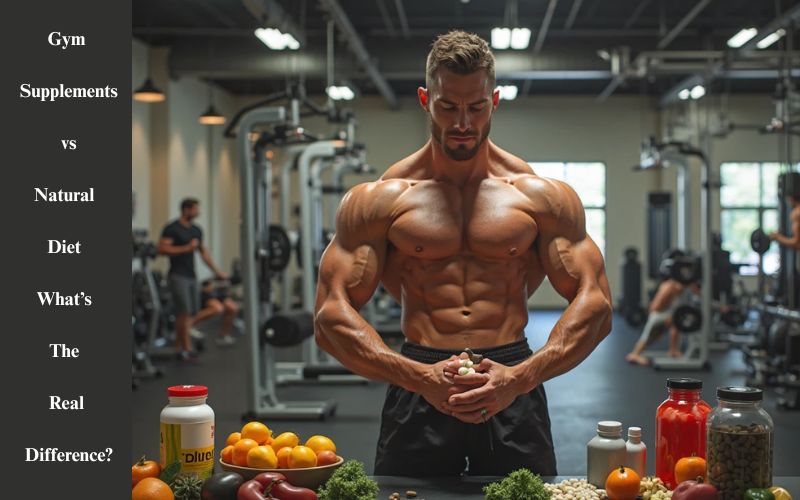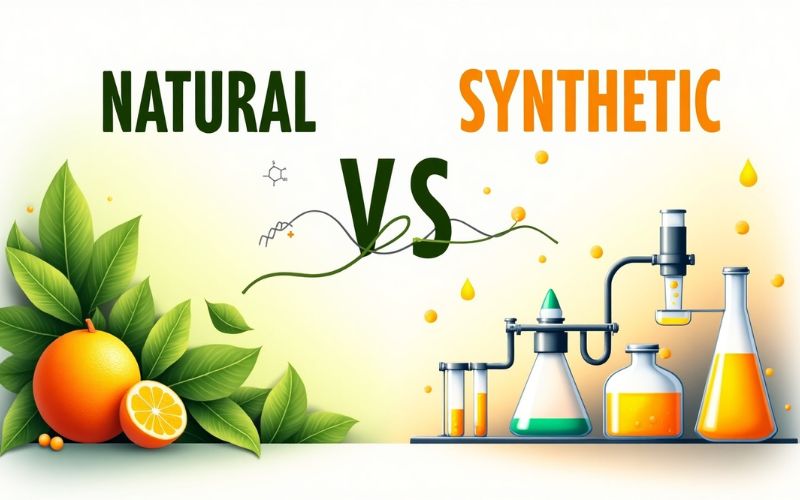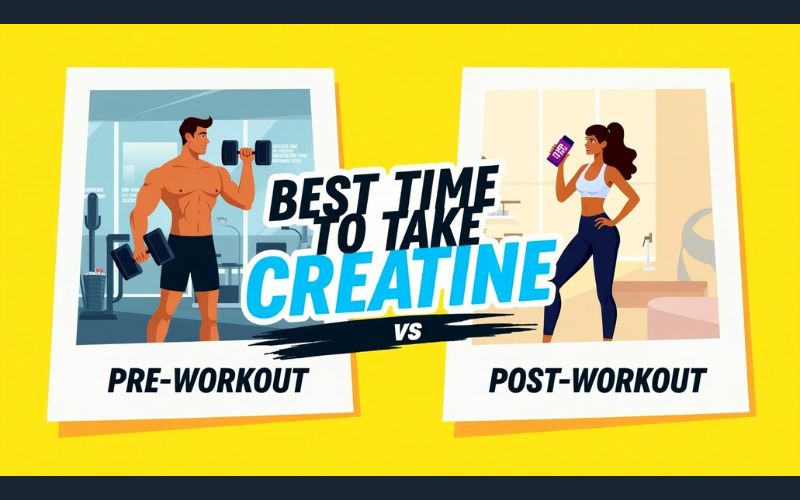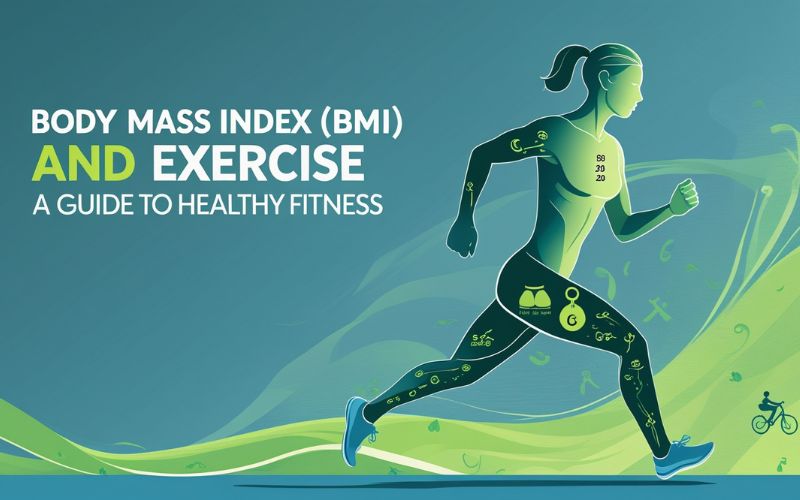The debate between gym supplements and natural diets is ongoing in the fitness world. While supplements promise convenience and quick gains, natural foods offer holistic nourishment rooted in centuries of tradition. But which path leads to sustainable fitness and optimal health? In this article, we’ll explore the pros and cons of each approach, backed by science and real-life experience, to help you make an informed decision.
Table of Contents
Understanding the Role of Nutrition in Muscle Growth and Recovery
Muscle growth isn’t built on training alone – it’s forged in the kitchen. Whether your goal is hypertrophy, fat loss, or endurance, the body requires a combination of macronutrients (protein, carbohydrates, and fats), micronutrients (vitamins and minerals), and adequate hydration. Recovery is driven by protein synthesis, glycogen replenishment, and hormonal balance – all influenced by your dietary choices.
Types of Common Gym Supplements and Their Purpose
Gym supplements are concentrated sources of specific nutrients designed to support athletic performance, muscle gain, and recovery. Common examples include:
- Whey Protein: Fast-digesting and rich in essential amino acids.
- Creatine Monohydrate: Improves strength, power output, and muscle hydration.
- BCAAs (Branched-Chain Amino Acids): May reduce muscle breakdown during intense workouts.
- Pre-Workouts: Stimulate energy, focus, and endurance with caffeine and other nootropics.
- Mass Gainers: High-calorie blends for those struggling to gain weight.
These supplements are formulated for convenience and performance – but are they essential?
Natural Whole Foods: The Original Powerhouse for Muscle Fuel
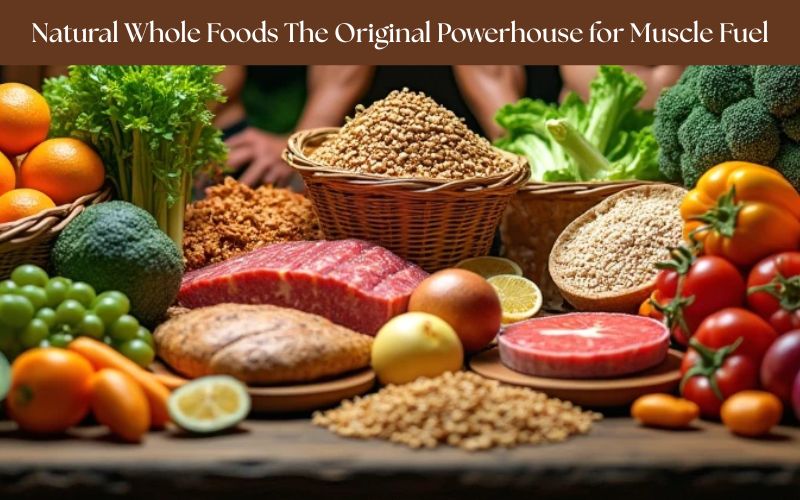
Whole foods such as eggs, lean meats, legumes, dairy, oats, and nuts offer more than isolated nutrients. They provide fiber, antioxidants, enzymes, and a balanced nutrient matrix that supports overall health. For instance, eating chicken breast not only provides protein but also zinc and B vitamins. An apple offers carbs along with polyphenols that aid recovery.
Natural foods support:
- Gut health
- Hormonal balance
- Long-term metabolic function
Protein Absorption and Bioavailability: Natural vs Supplement Form
Not all protein sources are equal in bioavailability – the body’s ability to digest, absorb, and utilize nutrients. For example:
- Whey protein: Rapid absorption with a high biological value (BV ~104)
- Eggs: Excellent absorption and amino acid profile (BV ~100)
- Plant-based proteins: Often lower in bioavailability unless combined strategically
Supplements offer quick absorption post-workout, while natural sources provide slower, sustained release – ideal for meal timing across the day.
Convenience and Accessibility: Are Supplements More Practical?
For people on the go, mixing a scoop of protein into water is undeniably easier than preparing a balanced meal. Gym supplements shine in:
- Busy schedules
- Post-workout windows
- Travel and meal prep gaps
However, over-reliance on convenience can lead to nutritional gaps and a detachment from mindful eating.
Nutrient Density and Additional Health Benefits of Whole Foods
Whole foods are nutrient-dense, meaning they pack essential vitamins, minerals, fiber, and antioxidants per calorie. These elements:
- Improve immune function
- Support gut microbiota
- Lower inflammation
- Enhance mental performance
In contrast, most supplements are designed for specific functions, not holistic health. A whey shake won’t replace the fiber and micronutrients from a bowl of quinoa and vegetables.
Are Gym Supplements Safe for Long-Term Use?
Generally, well-manufactured supplements from reputable brands are safe when used appropriately. However, risks include:
- Overconsumption (e.g., high caffeine intake from pre-workouts)
- Adulteration or contamination in unregulated products
- Digestive issues or nutrient imbalances from poor stacking
Natural foods, unless one has allergies or intolerances, rarely cause harm when eaten in moderation.
Cost Comparison: Are Supplements Worth the Money?
Supplements can be cost-effective per gram of protein but expensive in the long run. For example:
- 1 scoop whey protein (~25g protein) = 100–150 PKR
- 3 eggs (~18g protein) + whole grain toast = ~60–80 PKR with added nutrients
Whole foods may require more preparation time but provide better value when considering complete nutrition.
Sustainability and Lifestyle
Natural diets foster long-term sustainability by promoting home-cooked meals, variety, and cultural eating patterns. Supplements can feel transactional and may disconnect people from intuitive eating habits. That said, many athletes find a hybrid approach works best — using supplements for targeted goals while maintaining a whole-food foundation.
Combining Both for Optimal Results: Can You Have the Best of Both Worlds?
Yes – and this is often the ideal strategy.
- Use supplements to fill specific gaps, such as post-workout recovery or during cutting phases.
- Rely on natural foods for daily nourishment, meal satisfaction, and overall health.
For example, a breakfast of oats, banana, and eggs can be followed by a protein shake post-gym for muscle recovery – a synergistic approach.
Expert Recommendations: Finding the Right Balance for Your Goals
Experts recommend:
- Prioritizing whole food meals 80–90% of the time
- Using supplements as “tools,” not “shortcuts”
- Reading labels and avoiding proprietary blends or unverified products
- Aligning your diet strategy with your training intensity, goals, and budget
Consulting a certified dietitian or sports nutritionist ensures your approach is personalized and safe.
Final Verdict
There’s no clear “winner” – only what’s best for you. Supplements offer efficiency and targeted support, while natural foods offer depth and sustainability. The most successful fitness journeys balance both, adapting with your goals, lifestyle, and health needs.
FAQs on Gym Supplements vs Whole Foods Diet
Q: Are supplements necessary for muscle growth?
A: Not necessarily. Muscle growth can be achieved through whole foods alone, but supplements can help meet protein needs more easily.
Q: Can I replace meals with protein shakes?
A: Occasionally, yes — but whole meals are better for overall nutrition and satiety.
Q: What’s better post-workout — a meal or a shake?
A: A shake offers quicker absorption, but a balanced meal within 1–2 hours is equally effective.
Q: Can too many supplements harm the kidneys?
A: Excessive intake, especially without hydration or pre-existing kidney issues, may pose risks. Moderation is key.
Q: Is it okay to use both supplements and natural foods?
A: Absolutely. In fact, that’s often the most sustainable and effective strategy.














